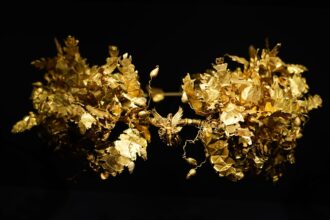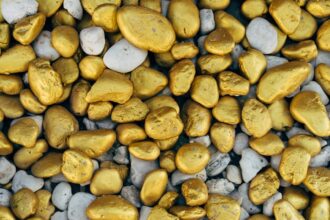African minerals have emerged as a cornerstone of global geopolitics, shaping international relations and economic strategies across the world. The continent is endowed with a wealth of natural resources, including precious metals, rare earth elements, and fossil fuels, which are critical for various industries, from technology to energy. As nations strive to secure their energy needs and technological advancements, the strategic importance of African minerals has only intensified.
This has led to a complex interplay of alliances and rivalries among global powers, each vying for access to these invaluable resources. The geopolitical significance of African minerals extends beyond mere economic interests; it also encompasses issues of national security and influence. Countries that control or have access to these resources can leverage them to enhance their global standing and assert their influence in international affairs.
For instance, the competition for cobalt, essential for electric vehicle batteries, has prompted nations to forge partnerships with African countries rich in this mineral. As the world transitions towards greener technologies, the demand for African minerals is expected to grow, further entrenching the continent’s role in global geopolitics.
Key Takeaways
- African minerals are central to global geopolitics, influencing international power dynamics and trade.
- China and Western powers actively compete for control and influence over Africa’s mineral resources.
- African governments are developing strategies to better manage and benefit from their mineral wealth.
- Mineral extraction in Africa poses significant environmental and social challenges, including conflicts and security issues.
- The future of African minerals will shape global trade, with increasing roles for African nations and international regulatory bodies.
China’s Influence in African Mineral Resources
China’s influence in African mineral resources has grown exponentially over the past two decades, driven by its insatiable appetite for raw materials to fuel its rapid industrialization. The Chinese government has strategically invested in mining operations across the continent, establishing partnerships with various African nations. This engagement is often framed as a win-win scenario, where China provides infrastructure development and investment in exchange for access to critical minerals.
Such arrangements have allowed China to secure a steady supply of essential resources while simultaneously bolstering its geopolitical clout. Moreover, China’s approach to African mineral extraction is characterized by a focus on long-term relationships rather than short-term gains. By investing in local communities and infrastructure, China has endeared itself to many African governments, who view these partnerships as a means to stimulate economic growth and development.
However, this growing influence has raised concerns among Western powers, who fear that China’s dominance in the mineral sector could undermine their own interests and lead to increased dependency on Chinese resources.
The Role of Western Powers in African Mineral Extraction

Western powers have historically played a significant role in the extraction of African minerals, often driven by their own economic interests and strategic objectives. Countries such as the United States, France, and the United Kingdom have established long-standing relationships with various African nations, facilitating access to valuable resources. However, the dynamics of these relationships have evolved over time, particularly in response to China’s increasing presence on the continent.
In recent years, Western powers have sought to reassert their influence in Africa by promoting responsible mining practices and sustainable development. Initiatives aimed at improving transparency and governance in the mineral sector have gained traction, as Western nations recognize the importance of ethical sourcing in an increasingly interconnected world. Nevertheless, the competition with China remains fierce, prompting Western countries to explore new strategies to maintain their foothold in Africa’s mineral-rich landscape.
African Governments’ Strategies for Resource Management
| Country | Key Strategy | Focus Area | Implementation Status | Impact Metrics |
|---|---|---|---|---|
| South Africa | Integrated Water Resource Management (IWRM) | Water Conservation and Allocation | Advanced | Improved water use efficiency by 25% (2015-2023) |
| Kenya | Community-Based Natural Resource Management (CBNRM) | Forestry and Wildlife Conservation | Ongoing | Increase in forest cover by 10% in community areas |
| Ghana | Renewable Energy Development | Energy Resource Diversification | Developing | Renewable energy accounts for 40% of total energy mix |
| Nigeria | Oil Revenue Management and Transparency | Natural Resource Revenue Governance | Improving | Reduction in corruption cases by 15% (2018-2023) |
| Rwanda | Land Use Planning and Soil Conservation | Agricultural Resource Management | Advanced | Soil erosion reduced by 30% in targeted regions |
African governments are increasingly recognizing the need for effective resource management strategies to maximize the benefits derived from their mineral wealth. Many nations are implementing policies aimed at enhancing local content requirements, ensuring that a greater share of mineral revenues is retained within their borders. This shift reflects a growing awareness of the need to balance foreign investment with national interests, as governments seek to harness their resources for sustainable development.
Additionally, some African countries are exploring innovative approaches to resource management, such as establishing sovereign wealth funds that can help stabilize economies and fund social programs. By investing mineral revenues into long-term development projects, governments aim to create a more resilient economic framework that can withstand fluctuations in global commodity prices. This proactive stance not only empowers African nations but also positions them as key players in the global mineral market.
Environmental and Social Impacts of Mineral Extraction in Africa
The extraction of minerals in Africa has significant environmental and social implications that cannot be overlooked. Mining activities often lead to deforestation, soil degradation, and water pollution, posing serious threats to local ecosystems and communities. The environmental degradation resulting from mining operations can have long-lasting effects on biodiversity and natural resources, undermining the very foundations of local livelihoods.
Communities often find themselves displaced or marginalized as mining companies expand their operations. Moreover, the influx of foreign workers can create tensions with local populations, who may feel excluded from the benefits of resource extraction.
Addressing these challenges requires a concerted effort from both governments and mining companies to prioritize sustainable practices and engage with local communities in meaningful ways.
The Rise of African Countries as Key Players in the Global Mineral Market

In recent years, several African countries have emerged as key players in the global mineral market, challenging traditional power dynamics and asserting their agency on the international stage. Nations such as South Africa, Zambia, and the Democratic Republic of Congo have become significant producers of minerals like platinum, copper, and cobalt. This rise is not merely a result of resource endowment; it is also driven by strategic investments in infrastructure and human capital.
As these countries enhance their production capabilities and improve regulatory frameworks, they are better positioned to negotiate favorable terms with foreign investors. This shift has led to increased competition among global powers seeking access to African minerals, further elevating the continent’s status in global trade networks. The emergence of African nations as influential players underscores the importance of recognizing their agency and potential in shaping the future of the mineral market.
Competition for Rare Earth Minerals in Africa
The competition for rare earth minerals in Africa has intensified as global demand for these critical resources continues to rise. Rare earth elements are essential for various high-tech applications, including electronics, renewable energy technologies, and defense systems. As countries strive to secure their supply chains amid geopolitical tensions, Africa’s rich deposits of rare earth minerals have become increasingly attractive.
This competition has prompted both state and non-state actors to engage in strategic partnerships with African nations rich in rare earth minerals. However, this rush for resources raises concerns about environmental sustainability and social equity. As countries navigate this competitive landscape, it is crucial for them to prioritize responsible mining practices that protect both people and the planet while ensuring that they reap the benefits of their mineral wealth.
Geopolitical Implications of African Mineral Resources on Global Trade
The geopolitical implications of African mineral resources extend far beyond the continent itself; they reverberate throughout global trade networks and international relations. As nations compete for access to Africa’s vast mineral wealth, alliances are formed and rivalries emerge, reshaping traditional power dynamics. The strategic importance of these resources has led countries to reevaluate their foreign policies and trade agreements in light of securing reliable access to essential materials.
Furthermore, the increasing reliance on African minerals has prompted discussions about supply chain resilience and diversification among global powers. As geopolitical tensions rise—particularly between major players like the United States and China—countries are seeking to reduce their dependence on any single source of supply. This shift could lead to new trade partnerships and investment strategies that prioritize stability and sustainability in resource extraction.
Security Concerns and Conflicts in African Mineral-Rich Regions
The presence of valuable mineral resources often correlates with heightened security concerns and conflicts within African nations. Regions rich in minerals can become hotspots for violence as various groups vie for control over lucrative assets. Armed conflicts fueled by competition for resources can destabilize entire regions, leading to humanitarian crises and displacement of populations.
Moreover, the involvement of external actors—whether state or non-state—can exacerbate existing tensions and complicate conflict resolution efforts. The interplay between local grievances and external interests creates a complex landscape where security challenges are intertwined with economic aspirations. Addressing these issues requires a multifaceted approach that prioritizes peacebuilding efforts alongside responsible resource management.
The Role of International Organizations in Regulating African Mineral Extraction
International organizations play a crucial role in regulating African mineral extraction by promoting best practices and fostering cooperation among stakeholders.
Additionally, organizations like the United Nations and regional bodies such as the African Union are increasingly involved in addressing issues related to resource governance and conflict prevention.
By facilitating dialogue among governments, civil society organizations, and private sector actors, these institutions aim to create frameworks that promote responsible mining practices while safeguarding human rights and environmental integrity.
The Future of African Mineral Resources in the Global Geopolitical Landscape
The future of African mineral resources in the global geopolitical landscape is poised for transformation as emerging trends reshape the dynamics of resource extraction and trade. As demand for critical minerals continues to rise—driven by technological advancements and the transition towards renewable energy—African nations are likely to play an increasingly central role in meeting global needs. However, this future is not without challenges.
Balancing economic growth with environmental sustainability will require innovative approaches to resource management that prioritize both people and planet. Additionally, navigating geopolitical rivalries will necessitate strategic diplomacy among African nations as they assert their interests on the world stage. In conclusion, the importance of African minerals extends far beyond mere economic considerations; they are integral to shaping global geopolitics and trade dynamics.
As countries navigate this complex landscape, it is essential for all stakeholders—governments, corporations, civil society organizations—to work collaboratively towards sustainable solutions that benefit both Africa and the world at large.
Geopolitical competition for African minerals has intensified in recent years, as nations vie for access to the continent’s rich resources. A related article that delves into this topic can be found on In The War Room, which explores the strategic implications of mineral wealth in Africa and how it influences global power dynamics. For more insights, you can read the article [here](https://www.inthewarroom.com/).
WATCH THIS! The Secret War for Africa’s Gold: How Private Armies Fund Global Conflict
FAQs
What is the geopolitical competition for African minerals?
Geopolitical competition for African minerals refers to the strategic rivalry among countries and multinational corporations to access and control Africa’s vast mineral resources. These minerals are critical for various industries, including technology, energy, and manufacturing.
Why are African minerals important in global geopolitics?
African minerals are essential because they include rare earth elements, cobalt, lithium, and other critical materials needed for batteries, electronics, renewable energy technologies, and defense industries. Control over these resources can influence global supply chains and economic power.
Which countries are most involved in the competition for African minerals?
Key players include China, the United States, the European Union, Russia, and India. China has been particularly active through investments and infrastructure projects, while Western countries are increasing their engagement to diversify supply sources and reduce dependency.
What are some of the main minerals found in Africa that attract geopolitical interest?
Important minerals include cobalt (mainly from the Democratic Republic of Congo), lithium, manganese, platinum group metals, gold, diamonds, and rare earth elements. These minerals are vital for high-tech industries and clean energy technologies.
How does the competition for African minerals impact the continent?
The competition can lead to increased investment and economic development but also raises concerns about resource exploitation, environmental degradation, and political instability. It can influence local governance and international relations within African countries.
What role do multinational corporations play in the geopolitical competition for African minerals?
Multinational corporations often partner with governments or operate independently to extract and process minerals. Their activities can drive economic growth but also raise issues related to labor rights, environmental standards, and equitable resource distribution.
How are African countries responding to the geopolitical competition for their mineral resources?
Many African countries are seeking to leverage their mineral wealth for sustainable development by negotiating better terms with foreign investors, developing local industries, and implementing policies to ensure environmental protection and social benefits.
What are the potential risks associated with the geopolitical competition for African minerals?
Risks include resource nationalism, increased corruption, conflict over resource control, environmental harm, and the potential for external powers to exert undue influence on African political and economic affairs.
How does the global demand for clean energy technologies influence the competition for African minerals?
The transition to clean energy increases demand for minerals like cobalt, lithium, and rare earth elements, intensifying competition as countries seek to secure stable supplies for electric vehicles, batteries, and renewable energy infrastructure.
Are there international efforts to regulate the extraction and trade of African minerals?
Yes, initiatives such as the Kimberley Process for diamonds and various certification schemes aim to promote responsible sourcing. Additionally, international organizations and agreements seek to improve transparency, reduce conflict minerals, and encourage sustainable mining practices.




